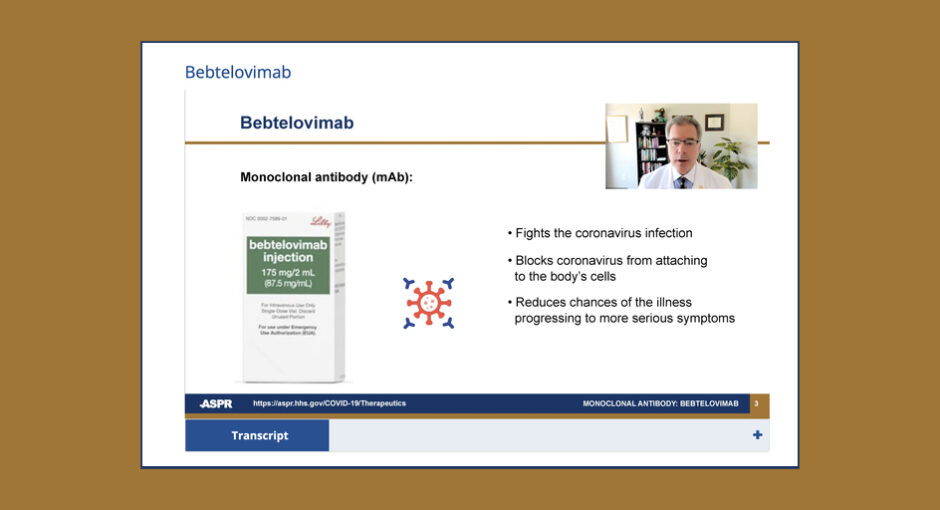The 340B statute should be amended to extend discounts to emergency-use drugs to treat COVID-19 as a first step in rebuilding the COVID-19 safety net, an opinion piece published yesterday in the medical journal Health Affairs says.
The Nov. 14 article was sounding an alarm as federal health officials begin to transition currently cost-free COVID-19 treatments, starting with Eli Lilly’s monoclonal antibody (mAb) bebtelovimab, out of a federally funded program begun at the start of the pandemic and into the commercial marketplace. The move is due to a lack of funding, the article said.
This means 340B covered entities will have to bear the full financial burden of the costly treatments including mAbs and eventually, the newer generation oral antivirals such as Pfizer’s Paxlovid, as the drugs are gradually dropped from the government-funded COVID-19 purchasing programs, the article said.
Enabling 340B discounts for such emergency use authorization (EUA) therapies would lessen the burden for 340B providers, some of which are already finically strapped, it said. EUA drugs are not currently eligible for 340B discounts, the article noted.
“The COVID-19 safety net was rapidly woven in the wake of a frightening worldwide pandemic. As time has passed, this safety net is unraveling,” said the opinion piece. “Communities that continue to be most affected by COVID-19 (such as communities of color, low-income, and high-density or multigenerational households) rely on the COVID-19 safety-net system that is being rapidly dismantled.”
The authors are Mika Hamer of the University of Colorado Center for Bioethics and Humanities, Kelsey Owsley of University of Arkansas for Medical Sciences, and Dr. Lindsey Fish of the Denver Health and Hospital Peña Urgent Care Clinic.
“There is an urgent and present need to continue offering COVID-19 treatment to high-risk patients, uninterrupted,” the article said. “Uninsured and underinsured populations should not have to wait for full FDA approval to access effective treatment, nor should safety-net institutions have to bear the financial burden of full-cost advanced purchasing.”
It added, “Ensuring access to bebtelovimab, Paxlovid, and [Merck/Ridgeback Pharmaceuticals’] Lagevrio, and future therapeutics should remain a high priority, as infections persist.”
The article calls on the U.S. Health Resources and Services Administration “to revise the 340B policy to allow discounted purchase of EUA therapeutics.”
“Allowing purchase of EUA drugs for COVID-19 under 340B represents a return to the program’s original intent of offering financial relief to entities serving the highest-need patients,” the article said. “This change would allow safety-net entities to more easily purchase and administer bebtelovimab through an already established process, once the new HHS program expires. The change would also set a precedent and would permit the uninterrupted purchase and delivery of Paxlovid and Lagevrio to high-need populations once those treatments transition to the commercial marketplace.”
In an interview with 340B Report, Madeline Wallack of RxX Consulting pointed out that Congress, not HRSA, would have make the change.
“HRSA does not have the authority to effectuate any change,” Wallack said. Wallack was a long-time analyst at the U.S. Department of Health and Human Services Office of Inspector General (OIG). During her time at the OIG, she co-authored a number of reports on the 340B program. “To include these drugs as part of what is defined as ‘covered’ under the 340B and Medicaid programs, Congress would need to take action and then there would likely need to be regulations on how to operationalize such changes.”
She added, “Another possible solution might be for the government to define an alternative discount mechanism to 340B entities for manufacturers transitioning EUA approved product to the commercial market, since these are currently not subject to the requirements of the statute.”
HHS announced Aug. 11 that Lilly’s bebtelovimab, which treats the Omicron variant and costs $2,100 per treatment, would be the first EUA drug to be dropped from the COVID federal purchasing and distribution program.
At the current pace of use, the HHS program is expected to exhaust its stockpile of 60,000 doses of bebtelovimab by mid-2023, the article estimated. Meanwhile, federal supplies of Paxlovid and Lagevrio will also likely run out at around the same time and, without additional investment, will be dropped into the marketplace “with no identified plans for ongoing treatment of uninsured/underinsured patients,” likely pricing many of them out of the market, the authors said.


